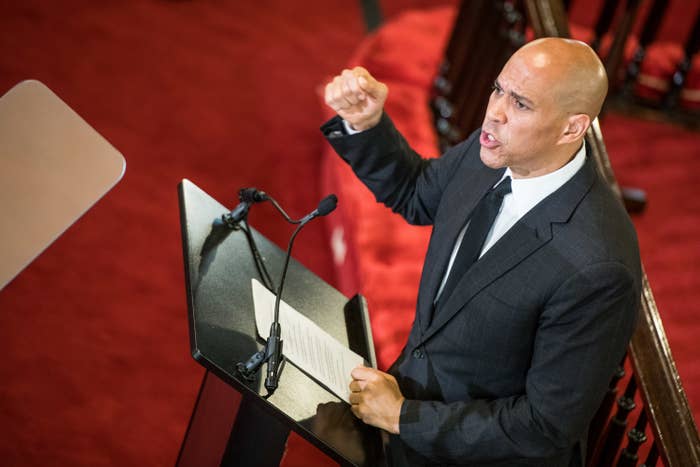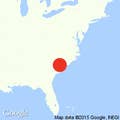
CHARLESTON, South Carolina — Cory Booker stood in the well in the hallowed halls of Emanuel African Methodist Episcopal Church on Wednesday morning and challenged Americans to act on the country's gun violence epidemic, just days after mass shootings in El Paso, Texas, and Dayton, Ohio, that killed at least 31 people and brought the country to a grieving halt.
Booker offered a lyrical and, at times, spirited speech that presented an intersectional message on the dangers that white supremacy and gun violence pose to America.
“We must acknowledge as a country that as much as white supremacy manifests itself in dangerous and deadly acts of terror, it is perpetuated by what is too often a willful ignorance or dangerous tolerance of its presence in our society,” Booker, the fourth black American ever popularly elected to the US Senate and now one of two top black candidates for president, said. “And the twisted irony of this poison is it’s corrosive; it hurts the very people it claims to represent.”
Booker reiterated his support for an assault weapons ban and called for a requirement for federal law enforcement to track terrorist threats by domestic-born white supremacists and report its findings annually. Earlier in his campaign, Booker had proposed a federal gun licensing program and closing the so-called Charleston loophole, which essentially allows some weapons to be obtained by consumers before routine background checks are complete. That change is meant to commemorate the nine people who were murdered here by a 21-year-old in 2015. The bill was sponsored by South Carolina Rep. and Majority Whip Jim Clyburn, the highest-ranking black Democrat in the House of Representatives.
“Each person, each generation, has a decision to make,” Booker said Wednesday. “Do you want to contribute to our collective advancement or — through inaction or worse — to our collective retrenchment? To our progress or — through apathy and indifference — to the violence that threatens to tear us asunder? That is the challenge of our generation today. It is the collective crossroads we are at.
“Addressing this isn’t an act of charity or philanthropy. It is an issue of national security, it is an issue of patriotism, it is an issue of love.”
On the evening of June 17, 2015, 12 parishioners were meeting for Bible study in the basement of Emanuel AME Church. A white shooter killed Clementa Pinckney, the South Carolina state senator and Mother Emanuel’s senior pastor, along with eight other people: Myra Thompson, Ethel Lance, Susie Jackson, Cynthia Hurd, Sharonda Coleman-Singleton, DePayne Middleton-Doctor, Tywanza Sanders, and Daniel Simmons. The shooter was found by Judge Richard Gergel to have no mental illness and was formally sentenced to death for his crimes in January 2017.
The events here and in El Paso are separated by four years, as many states, and 1,700 miles, but the massacres have a grim similarity: A weekly ritual was violently interrupted by assailants who sought to inflict pain on soft targets with greater significance. Before his act of terror, the Mother Emanuel shooter visited sites around Charleston tied to the state’s history, including Sullivan’s Island, where enslaved people, newly arrived, were held. The shooter, an avowed white supremacist, was also familiar with the church’s history, especially as it related to Denmark Vesey, who, according to legend, planned a slave revolt that never happened.
El Paso is one of America's unique border towns: Ciudad Juárez, Mexico, and El Paso are essentially connected, and for its former representative Beto O’Rourke, who is also a Democratic candidate in the 2020 primary, the community has served as a broad tableau for why Americans should feel comfortable moving toward better immigration policy. Law enforcement described the act at the city's shopping center as premeditated, saying the shooter drove hours across Texas to the border town.
In Charleston, Mother Emanuel seats 500. In the foyer, framed black-and-white pictures of the African Methodist Episcopal Church denomination's founder, Bishop Richard Allen, and his wife, Sarah, hang inside a dark frame. On Wednesday morning, the air was damp with the smell of wood. A lone officer paced about the building’s facade. Booker emerged wearing a dark suit and dark tie, a look he associates with civil rights causes — he donned a similar look at the commemoration of the “Bloody Sunday” march from Selma to Montgomery, Alabama, at Brown AME Church in Selma in March.
Earlier this week, Booker placed responsibility for the weekend shooting in El Paso at the feet of President Donald Trump. The senator did not mention Trump by name Wednesday morning, explicitly setting aside “calling out the shortcomings of our leaders.” Booker pointedly read a Scripture from the book of Galatians: “Do not be deceived, God is not mocked; for whatever a man sows, this he will also reap.”
"The act of anti-Latino, anti-immigrant hatred we witnessed this weekend did not start with the hand that pulled the trigger," Booker said. "It did not begin when a single white supremacist got into his car to travel 10 hours to kill as many human beings as he could. It was sowed from the highest office in our land, where we see in tweets and rhetoric hateful words that ultimately endanger the lives of people in our country. People of color, immigrants, of us all."
Although Booker described white supremacy as a more insidious disease that predated the president’s election, Booker’s words were his most direct on the topic yet. “White supremacy allows political leaders to promise to ‘build the wall’ — while not building hospitals, schools, or infrastructure. It talks about the invasion of immigrants — while allowing deadly opioids to invade communities and kill our children.
“And it creates a dangerous delusion that some among us are outside of our moral concern — that we don’t have to care about those ‘others.’ We don’t have to think about them, that they should express gratitude simply to be here — an idea that some Americans can even be a threat to other Americans just by existing, when, in reality, we share a common cause and a common purpose. There is only one American destiny.”
Booker said the shooter in Texas is representative of a long-festering problem in the country. “The act of anti-Latino and anti-immigrant hatred we witnessed this weekend did not start with the hand that pulled the trigger. It did not begin when a single white supremacist got into his car to travel 10 hours to kill as many human beings as he could,” he said. “They were planted in fertile soil because the contradictions that have shadowed this country since its founding remains a part of who we are.”
Lisa Izzo, an activist involved with the group Moms Demand Action in Charleston, said her horror at the events in El Paso recalled how, when she was a little girl, she had learned that there were two separate drinking fountains for students: one for black children and another for white students.
“That made the hair on my neck stand up, and I’m standing in this church all these years later,” Izzo said Wednesday morning. “It’s almost like it’s been under the surface all along and it’s rising with the hate speech we have, but now it’s clear that it’s not just Trump, and it’s painfully obvious we have this nightmare, and this is where we’re at.
“You know, I’m sitting there listening [to Booker] and thinking, How are we still here talking about this?”
As Trump prepared to leave Washington for Dayton and El Paso, someone rang a single note on the church’s chime bells at 9 a.m. sharp. Thirty minutes later, Booker appeared, flanked by Mother Emanuel's pastor, the Rev. Eric S.C. Manning. Manning introduced the senator, saying the church had stood against injustices and welcomed leaders who shared those values.
He said they’d feel comfortable with any candidate who wanted to come to speak out against the type of rhetoric that was tearing the country apart.
In an interview after the speech, Manning told BuzzFeed News that he and other leaders did not come to the decision to receive Booker lightly. “Always,” Manning said, when a local reporter asked if he’d been in prayer regarding the decision. He said he spent the few minutes before his introduction thinking about humility and Mother Emanuel’s role as a force for moral clarity.
“We have always taken a stand against the injustices of this world,” Manning said. “So I asked myself, well, who am I?”
Clay Middleton, an Army veteran and state director of Booker’s campaign in South Carolina, said he began reaching out to leaders once Booker heard of the carnage that unfolded in El Paso on Saturday. At various points, Booker has met with Pinckney’s widow, Jennifer, and Polly Sheppard, two survivors of the shooting. Sheppard testified during the gunman's trial that he said he was sparing her life for her to tell the story.
“It’s hard, but Cory has already set the tone,” Middleton said. “And it always goes back to our moral compass. We are one nation under God, and the Bible says that where two or more are gathered that God is in the midst. Those ideas are deeply rooted in faith, whether you are Christian, Muslim, or Jewish. These things are rooted in your faith, and he displayed that today with his words.”

